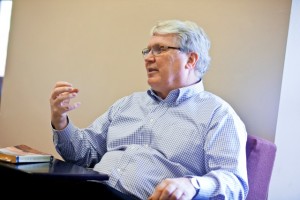
Professor David Johnson
You’ve seen this movie before, or at least one similar: Young, idealistic teacher is hired at a racially diverse, but not well-integrated high school, where the staff has basically given up on a group of unruly students who face tough challenges at home. The school neglects to tell the recent college grad that he is the fourth English teacher hired that year for this class; the other three either quit or worse.
Things get off to a shaky start, but the teacher—who is smart, tough, and compassionate—decides to replace textbooks with life lessons and slowly earns the students’ trust and respect.
And that’s how David Johnson, professor and head of English, got his start in teaching.
“There were a lot of characters in that class,” he says, remembering the likes of Donzella Pettijohn, who at over six feet tall was as imposing as her name implied, and Frederick Douglas Harrison, “one of the best extemporaneous comedians I ever met.”
“They were derelicts, but they got it that I was paying attention to them,” Johnson recalls. “I took them seriously and taught them things they could use.”
The plan was to finish out the year and then head to law school at University of Virginia. But then another year passed, and Johnson knew where he belonged. Swapping courtroom for classroom, he headed to Pennsylvania State University and earned a master’s and Ph.D. in American literature while studying under the late Philip Young, one of the foremost authorities on Ernest Hemingway.
After graduating in 1974, he came to Lafayette and has been here ever since. The recipient of numerous teaching awards, Johnson served as head of English from 1982-91, associate provost from 2001-08, and was reappointed department head in 2010.
It’s the writings of Conrad Richter—a novelist who won the Pulitzer Prize for The Town in 1951 and a National Book Award nearly a decade later for The Waters of Kronos—that have consumed and defined much of Johnson’s work.

Professor David Johnson teaches the Great American Writers course.
Born in Schuylkill County, Pa., Richter died in 1968 after writing more than a dozen books, a novella, and a host of short stories and magazine articles that primarily portray the hardships of frontier life. Published in 1936, Sea of Grass, one of his best known works, was later made into a movie starring Spencer Tracy and Katherine Hepburn. But despite his prolific outpouring, no one had chronicled the life of Richter, a complicated and private man who started his career as a newspaper reporter.
“He was the most important writer of his time without a biography,” says Johnson, who decided to remedy the omission.
But first he had to convince Richter’s only daughter, Harvena, an eccentric poet, novelist, and professor of creative writing at the University of New Mexico (UNM), to give him access to her father’s journals, correspondence, notebooks, and private papers—materials she protected with her life and a locked safe.
This required a bit of delicate gamesmanship on Johnson’s part. Fortunately, he had a friend who worked at UNM with Harvena, better known as Vene.
“Write to her,” the friend advised. So Johnson did, saying he would like to come to New Mexico in January 1984 over winter break. Her reply was curt but affirmative. Unfortunately, Johnson’s elation at her initial response was to be short-lived. About two weeks before he was scheduled to arrive, he received a postcard from Vene telling him she had a change of mind and he was no longer welcome.
“I already bought my plane ticket,” Johnson wrote back. “I will be there at 9 a.m. Monday knocking at your door. I hope you answer.”
She did. “She showed me the treasure trove, but then firmly shut the reinforced steel door,” he says. “She said she wasn’t ready for anyone to write about her father. She was afraid they would make him seem darker than he was and people would make fun of him.”
Undeterred, Johnson set out to prove he was a suitable biographer and would be fair and sensitive in the treatment of her father’s story. He also made her a deal. She could correct the factual errors of each chapter and offer advice about interpretation, which he may or may not take. Eventually, she gave Johnson complete access to her father’s papers, some 50,000 pages. The journals spanned 44 years and detailed everything from fights with his wife and worries over his daughter to anxieties about his writing.
As a result, an enduring friendship developed between Johnson and Vene, who passed away this summer at age 94 after making Johnson her literary executor.
Conrad Richter: A Writer’s Life was published in 2000 to enthusiastic reviews. Even Vene liked it, saying in a letter to Johnson that it was “better than I expected”—high praise from a sometimes persnickety and protective daughter.
Johnson’s engagement with literary icons is now reserved for the classroom where he teaches American Novel to 1900, a course that explores the works of Hawthorne, Melville, Twain, James, and others. His teaching style is Socratic; he asks questions, challenging the class to delve below the surface for answers.
“When you do that you help them become critical readers and place the works in a historical context,” he says.
During a recent class discussion of Henry James’ The American, one student said, “I don’t know if it’s appropriate to ask this or whether I should figure it out on my own, but are you supposed to like Christopher Newman?”
Johnson responded mischievously: “What do you think?”
There are no Donzella Pettijohns or Frederick Douglas Harrisons in this class—just a bunch of really bright and thoughtful students, who also appreciate that their ideas are being taken seriously.


2 Comments
I arrived at Lafayette in 1974 as a Math major; I failed Math. 11 and received an A
from Professor Johnson in English 05. In English 06 I wrote an excellent theme about
the Duke and the King in Huck Finn, and Professor Johnson (wrongfully) accused me
of plagiarism. When he was later satisfied that I wrote it myself, he gave me an A minus.
I switched my major to English because I had written a theme that a Lafayette professor
thought was much too advanced for a Lafayette freshman (And because I failed
Math 11.).
I enrolled in three more courses taught by Professor Johnson; I viewed his mistaken accusation as a compliment, plus, his classes were much more interesting than the rest
of the English Dept. faculty at the time.
Lafayette is fortunate to have retained him for all these years, as well as having retained
History Professor Donald Miller for a similar length of time. My comment is a compliment to them, but their distinguished careers are a greater compliment to Lafayette College.
My son is a big fan and I hope Dr. Johnson can mentor him.
Comments are closed.